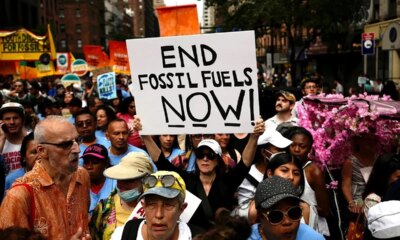Politics
With 13 days until voting starts, 'election season' kicks off sooner than you think

There are 73 days until Election Day on Tuesday, Nov. 5.
But if Americans vote like they did in the last two election cycles, most of them will have already cast a ballot before the big day.
Early voting starts as soon as Sept. 6 for eligible voters, with seven battleground states sending out ballots to at least some voters the same month.
It makes the next few months less a countdown to Election Day, and more the beginning of “election season.”
VANCE PRAISED FOR ‘ABSOLUTE FIRE’ TAKEDOWN OF HARRIS-WALZ ‘TAG TEAM’ RIOT ENABLERS: ‘MAKE AMERICA BURN AGAIN’
Former President Trump and Vice President Kamala Harris. (Getty Images)
States have long allowed at least some Americans to vote early, like members of the military or people with illnesses.
In some states, almost every voter casts a ballot by mail.
Many states expanded eligibility in 2020, when the COVID-19 pandemic made it riskier to vote in-person.
That year, the Fox News Voter Analysis found that 71% of voters cast their ballots before Election Day, with 30% voting early in-person and 41% voting by mail.
Early voting remained popular in the midterms, with 57% of voters casting a ballot before Election Day.
TIM WALZ’S SELECTION AS HARRIS RUNNING MATE DRAWS SKEPTICISM, EVEN AMONG ANTI-TRUMP FIGURES
A voter fills out a ballot in Lake Orion, Michigan. (Nic Antaya/Bloomberg via Getty Images)
Elections officials stress that voting early is safe and secure. Recounts, investigations and lawsuits filed after the 2020 election did not reveal evidence of widespread fraud or corruption.
The difference between “early in-person” and “mail” or “absentee” voting.
There are a few ways to vote before Election Day.
The first is early in-person voting, where a voter casts a regular ballot in-person at a voting center before Election Day.
The second is voting by mail, where the process and eligibility varies by state.
Eight states vote mostly by mail, including California, Colorado, Nevada and Utah. Registered voters receive ballots and send them back.
Most states allow any registered voter to request a mail ballot and send it back. This is also called mail voting, or sometimes absentee voting. Depending on the state, voters can return their ballot by mail, at a drop box, and/or at an office or facility that accepts mail ballots.
In 14 states, voters must have an excuse to vote by mail, ranging from illness, age, work hours or if a voter is out of their home county on Election Day.
States process and tabulate ballots at different times. Some states don’t begin counting ballots until election night, which delays the release of results.
Voting begins on Sept. 6 in North Carolina, with seven more battleground states starting that month
This list of early voting dates is for guidance only. For comprehensive and up-to-date information on voter eligibility, processes and deadlines, go to Vote.gov and your state’s elections website.
The first voters to be sent absentee ballots will be in North Carolina, which begins mailing out ballots for eligible voters on Sept. 6.
Seven more battleground states open up early voting the same month, including Pennsylvania, Georgia, Wisconsin, Michigan and Nevada.
KAMALA HARRIS HAS AVOIDED INTERVIEWS FOR MORE THAN TWO WEEKS SINCE BECOMING DEM NOMINEE
Early voters cast their ballots in Ferndale, Michigan. (Nic Antaya/Bloomberg via Getty Images)
September deadlines
In-person early voting in bold.
Sept. 6
- North Carolina – Absentee ballots sent to voters
Sept. 16
- Pennsylvania – Mail-in ballots sent to voters
Sept. 17
- Georgia – Absentee ballots sent to military & overseas
Sept. 19
- Wisconsin – Absentee ballots sent
Sept. 20
- Arkansas, Montana, Nebraska, North Dakota, Ohio, Utah, Wyoming – Absentee ballots sent to military & overseas
- Minnesota, South Dakota – In-person absentee voting begins
- Virginia – In-person early voting begins
- Indiana, Kentucky, West Virginia – Absentee ballots sent
Sept. 21
- Alabama, Alaska, Colorado, Connecticut, Florida, Kansas, Massachusetts, Maryland, Michigan, New Hampshire, New York, Oregon, South Carolina, Washington – Absentee ballots sent to military & overseas
- Indiana, New Mexico – Absentee ballots sent
- Maryland, New Jersey – Mail-in ballots sent
Sept. 23
- Mississippi – In-person absentee voting begins & absentee ballots sent
- Oregon, Vermont – Absentee ballots sent
Sept. 26
- Illinois – In-person early voting begins
- Michigan – Absentee ballots sent
- Florida, Nevada – Mail-in ballots sent
- North Dakota – Absentee & mail-in ballots sent
Sept. 30
- Nebraska – Mail-in ballots sent
October deadlines
Oct. 4
- Connecticut – Absentee ballots sent
Oct. 6
- Michigan – In-person early voting begins
- Maine – In-person absentee voting begins & mail ballots sent
- California – In-person absentee voting begins & mail ballots sent
- Montana – In-person absentee voting begins
- Nebraska – In-person early voting begins
- Georgia – Absentee ballots sent
- Massachusetts – Mail-in ballots sent
Oct. 8
- California – Ballot drop-offs open
- New Mexico, Ohio – In-person absentee voting begins
- Indiana – In-person early voting begins
- Wyoming – In-person absentee voting begins & absentee ballots sent
Oct. 9
- Arizona – In-person early voting begins & mail ballots sent
Oct. 11
- Colorado – Mail-in ballots sent
- Arkansas, Alaska – Absentee ballots sent
Oct. 15
- Georgia – In-person early voting begins
- Utah – Mail-in ballots sent
Oct. 16
- Rhode Island, Kansas, Tennessee – In-person early voting begins
- Iowa – In-person absentee voting begins
- Oregon, Nevada – Mail-in ballots sent
Oct. 17
- North Carolina – In-person early voting begins
Oct. 18
- Washington, Louisiana – In-person early voting begins
- Hawaii – Mail-in ballots sent
Oct. 19
- Nevada, Massachusetts – In-person early voting begins
- Alaska, Arkansas, Connecticut, Idaho, North Dakota, South Carolina, Texas – In-person early voting begins
- Colorado – Ballot drop-offs open
Oct. 22
- Hawaii, Utah – In-person early voting begins
- Missouri, Wisconsin – In-person absentee voting begins
Oct. 23
- West Virginia – In-person early voting begins
Oct. 24
- Maryland – In-person early voting begins
Oct. 25
- Delaware – In-person early voting begins
Oct. 26
- Michigan, Florida, New Jersey, New York – In-person early voting begins
Oct. 30
- Oklahoma – In-person early voting begins
Oct. 31
- Kentucky – In-person absentee voting begins

Politics
Video: Trump Announces Construction of New Warships

new video loaded: Trump Announces Construction of New Warships
transcript
transcript
Trump Announces Construction of New Warships
President Trump announced on Monday the construction of new warships for the U.S. Navy he called a “golden fleet.” Navy officials said the vessels would notionally have the ability to launch hypersonic and nuclear-armed cruise missiles.
-
We’re calling it the golden fleet, that we’re building for the United States Navy. As you know, we’re desperately in need of ships. Our ships are, some of them have gotten old and tired and obsolete, and we’re going to go the exact opposite direction. They’ll help maintain American military supremacy, revive the American shipbuilding industry, and inspire fear in America’s enemies all over the world. We want respect.

By Nailah Morgan
December 23, 2025
Politics
404 | Fox News
This material may not be published, broadcast, rewritten, or redistributed. ©2021 FOX News Network, LLC. All rights reserved. Quotes displayed in real-time or delayed by at least 15 minutes. Market data provided by Factset. Powered and implemented by FactSet Digital Solutions. Legal Statement. Mutual Fund and ETF data provided by Refinitiv Lipper.
Politics
Commentary: ‘It’s a Wonderful ICE?’ Trumpworld tries to hijack a holiday classic

For decades, American families have gathered to watch “It’s a Wonderful Life” on Christmas Eve.
The 1946 Frank Capra movie, about a man who on one of the worst days of his life discovers how he has positively impacted his hometown of Bedford Falls, is beloved for extolling selflessness, community and the little guy taking on rapacious capitalists. Take those values, add in powerful acting and the promise of light in the darkest of hours, and it’s the only movie that makes me cry.
No less a figure of goodwill than Pope Leo XIV revealed last month that it’s one of his favorite movies. But as with anything holy in this nation, President Trump and his followers are trying to hijack the holiday classic.
Last weekend, the Department of Homeland Security posted two videos celebrating its mass deportation campaign. One, titled “It’s a Wonderful Flight,” re-creates the scene where George Bailey (Jimmy Stewart in one of his best performances) contemplates taking his own life by jumping off a snowy bridge. But the protagonist is a Latino man crying over the film’s despairing score that he’ll “do anything” to return to his wife and kids and “live again.”
Cut to the same man now mugging for the camera on a plane ride out of the United States. The scene ends with a plug for an app that allows undocumented immigrants to take up Homeland Security’s offer of a free self-deportation flight and a $1,000 bonus — $3,000 if they take the one-way trip during the holidays.
The other DHS clip is a montage of Yuletide cheer — Santa, elves, stockings, dancing — over a sped-up electro-trash remake of Mariah Carey’s “All I Want for Christmas is You.” In one split-second image, Bedford Falls residents sing “Auld Lang Syne,” just after they’ve saved George Bailey from financial ruin and an arrest warrant.
“This Christmas,” the caption reads, “our hearts grow as our illegal population shrinks.”
“It’s a Wonderful Life” has long served as a political Rorschach test. Conservatives once thought Capra’s masterpiece was so anti-American for its vilification of big-time bankers that they accused him of sneaking in pro-Communist propaganda. In fact, the director was a Republican who paused his career during World War II to make short documentaries for the Department of War. Progressives tend to loathe the film’s patriotism, its sappiness, its relegation of Black people to the background and its depiction of urban life as downright demonic.
Then came Trump’s rise to power. His similarity to the film’s villain, Mr. Potter — a wealthy, nasty slumlord who names everything he takes control of after himself — was easier to point out than spots on a cheetah. Left-leaning essayists quickly made the facile comparison, and a 2018 “Saturday Night Live” parody imagining a country without Trump as president so infuriated him that he threatened to sue.
But in recent years, Trumpworld has claimed that the film is actually a parable about their dear leader.
Trump is a modern day George Bailey, the argument goes, a secular saint walking away from sure riches to try to save the “rabble” that Mr. Potter — who in their minds somehow represents the liberal elite — sneers at. A speaker at the 2020 Republican National Convention explicitly made the comparison, and the recent Homeland Security videos warping “It’s a Wonderful Life” imply it too — except now, it’s unchecked immigration that threatens Bedford Falls.
The Trump administration’s take on “It’s a Wonderful Life” is that it reflects a simpler, better, whiter time. But that’s a conscious misinterpretation of this most American of movies, whose foundation is strengthened by immigrant dreams.
Director Frank Capra
(Handout)
In his 1971 autobiography “The Name Above the Title,” Capra revealed that his “dirty, hollowed-out immigrant family” left Sicily for Los Angeles in the 1900s to reunite with an older brother who “jumped the ship” to enter the U.S. years before. Young Frank grew up in the “sleazy Sicilian ghetto” of Lincoln Heights, finding kinship at Manual Arts High with the “riff-raff” of immigrant and working-class white kids “other schools discarded” and earning U.S. citizenship only after serving in the first World War. Hard times wouldn’t stop Capra and his peers from achieving success.
The director captured that sentiment in “It’s a Wonderful Life” through the character of Giuseppe Martini, an Italian immigrant who runs a bar. His heavily accented English is heard early in the film as one of many Bedford Falls residents praying for Bailey. In a flashback, Martini is seen leaving his shabby Potter-owned apartment with a goat and a troop of kids for a suburban tract home that Bailey developed and sold to him.
Today, Trumpworld would cast the Martinis as swarthy invaders destroying the American way of life. In “It’s a Wonderful Life,” they’re America itself.
When an angry husband punches Bailey at Martini’s bar for insulting his wife, the immigrant kicks out the man for assaulting his “best friend.” And when Bedford Falls gathers at the end of the film to raise funds and save Bailey, it’s Martini who arrives with the night’s profits from his business, as well as wine for everyone to celebrate.
Immigrants are so key to the good life in this country, the film argues, that in the alternate reality if George Bailey had never lived, Martini is nowhere to be heard.
Capra long stated that “It’s a Wonderful Life” was his favorite of his own movies, adding in his memoir that it was a love letter “for the Magdalenes stoned by hypocrites and the afflicted Lazaruses with only dogs to lick their sores.”
I’ve tried to catch at least the ending every Christmas Eve to warm my spirits, no matter how bad things may be. But after Homeland Security’s hijacking of Capra’s message, I made time to watch the entire film, which I’ve seen at least 10 times, before its customary airing on NBC.
I shook my head, feeling the deja vu, as Bailey’s father sighed, “In this town, there’s no place for any man unless they crawl to Potter.”
I cheered as Bailey told Potter years later, “You think the whole world revolves around you and your money. Well, it doesn’t.” I wondered why more people haven’t said that to Trump.
When Potter ridiculed Bailey as someone “trapped into frittering his life away playing nursemaid to a lot of garlic eaters,” I was reminded of the right-wingers who portray those of us who stand up to Trump’s cruelty as stupid and even treasonous.
And as the famous conclusion came, all I thought about was immigrants.
People giving Bailey whatever money they could spare reminded me of how regular folks have done a far better job standing up to Trump’s deportation Leviathan than the rich and mighty have.
As the film ends, with Bailey and his family looking on in awe at how many people came to help out, I remembered my own immigrant elders, who also forsook dreams and careers so their children could achieve their own — the only reward to a lifetime of silent sacrifice.
The tears flowed as always, this time prompted by a new takeaway that was always there — “Solo el pueblo salva el pueblo,” or “Only we can save ourselves,” a phrase adopted by pro-immigrant activists in Southern California this year as a mantra of comfort and resistance.
It’s the heart of “It’s a Wonderful Life” and the opposite of Trump’s push to make us all dependent on his mercy. He and his fellow Potters can’t do anything to change that truth.
-

 Iowa1 week ago
Iowa1 week agoAddy Brown motivated to step up in Audi Crooks’ absence vs. UNI
-

 Maine1 week ago
Maine1 week agoElementary-aged student killed in school bus crash in southern Maine
-

 Maryland1 week ago
Maryland1 week agoFrigid temperatures to start the week in Maryland
-

 New Mexico7 days ago
New Mexico7 days agoFamily clarifies why they believe missing New Mexico man is dead
-

 South Dakota1 week ago
South Dakota1 week agoNature: Snow in South Dakota
-

 Detroit, MI1 week ago
Detroit, MI1 week ago‘Love being a pedo’: Metro Detroit doctor, attorney, therapist accused in web of child porn chats
-

 Health1 week ago
Health1 week ago‘Aggressive’ new flu variant sweeps globe as doctors warn of severe symptoms
-

 Maine7 days ago
Maine7 days agoFamily in Maine host food pantry for deer | Hand Off

















